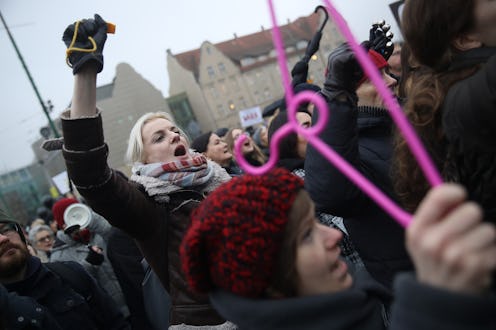News
I Saw A Woman Die From A Self-Induced Abortion — That's The Cost Of Our Silence

A few months ago, I got a tattoo of a coat hanger on my right wrist. When people ask me what it means, I tell them the story of the woman I once met who didn't deserve to die. I tell them about the lack of access to safe and legal abortion that killed her.
Warning: Some readers may find the following details graphic and triggering.
At the time, I worked as a resident at a hospital in Botswana. This woman had tried to end her pregnancy with a "coat hanger abortion" — in her case, by placing sticks through her vagina into her uterus. She was pronounced dead on arrival to the hospital. She was 22 years old. She died because she lived in a country where safe and legal abortion did not exist.
I thought this could never happen in the present-day United States. I was wrong.
We don't know exactly how many women attempt to have a "self-managed abortion" in the United States, but internet search history and preliminary data suggest these types of abortions are on the rise. As an obstetrics and gynecology resident, I go to work each day and provide abortions for my patients, and I come home each night to read headlines summarizing the chipping away of our rights.
"Sexual assault" is no longer a phrase we have to whisper in the shadows. "Abortion" doesn't have to be either.
I have read about Ohio trying to allow criminal charges to be brought against women seeking abortions. I have read about states passing legislation to prevent abortions at earlier and earlier gestational ages. I have read about the new and unreasonable requirements for abortion clinics, and how these requirements are shutting down an increasing number of facilities that provide abortions. I have read about Trump bannng U.S. foreign aid to groups that even discuss abortion, making it harder for women all around the world to get the medical care they need. I read about all these things, and I think about the young women in the U.S. and abroad that may die because they can't access safe abortion services.
What I believe we need, now more than ever, is a movement that takes inspiration from #MeToo. A movement for everybody who has had an abortion, supports abortion, and provides abortions.
Long before Tarana Burke founded #MeToo, and long before her movement went viral in 2017, individual women had come forward to tell their stories of sexual assault. And for decades, those women were dismissed and dehumanized. It was easier to stay quiet.
Now, thanks to #MeToo and activism like it, we're challenging the roots of that culture. In the words of Sophie Gilbert in The Atlantic, "The power of #MeToo is that it takes something that women had long kept quiet about and transforms it into a movement."
"Sexual assault" is no longer a phrase we have to whisper in the shadows. "Abortion" doesn't have to be either.
We need to be bigger and louder to force change.
The two share something disturbing in common: The loss of control over one's own body. At its heart, #MeToo is about our right to control our own bodies, and about the staggering number of us who have experienced a violation of that control. And as with the normalization of sexual assault, the criminalization of abortion poses serious threats to our right to control our bodies. What the criminalization of abortion is telling us is that our decisions, our voices, and our stories don't matter.
Abortion remains one of the most common procedures women undergo worldwide, with one in four women in the United States choosing a termination before the age of 45. As an OBGYN, I have sat with many women as they have made their decision to have an abortion. For some, the decision comes easily. For others, the decision takes hours, days, or weeks of agonizing. But for every one of these women, the decision is made out of necessity.
Of course, telling our stories about abortion, like telling our stories about sexual assault, is scary. Women who accuse their rapists have often been called "sluts" and "liars." Women who seek abortions are often labelled "baby killers." Yet, part of the power of the #MeToo movement is that it provided safety in its massive numbers. Not everybody felt safe speaking up, but many did — people from all races, all demographics, and all cultural backgrounds.
The good news? We are not starting from scratch. Already, women are coming forward to share their powerful and beautiful abortion stories with groups like #ShoutYourAbortion, a decentralized network of individuals talking about abortion on their own terms. Since its development in 2015, the hashtag #ShoutYourAbortion has been used over 300,000 times. But 300,000 is not enough.
As with the #MeToo movement, we need to be bigger and louder to force change. We must come together in even larger numbers — as women having abortions, women and men supporting loved ones having abortions, and providers doing abortions, to shout our abortions. Together, we cannot be silenced. Together, we can find safety and power. Together, we can make change.
This op-ed solely reflects the views of the author, and is part of a larger, feminist discourse.